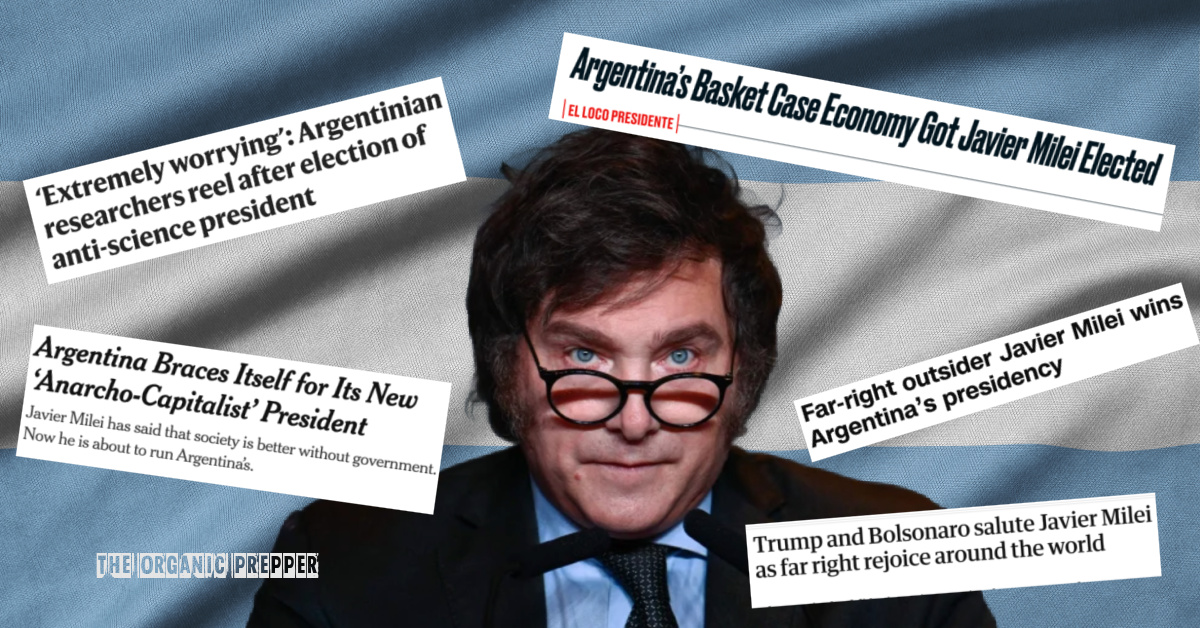(Psst: The FTC wants me to remind you that this website contains affiliate links. That means if you make a purchase from a link you click on, I might receive a small commission. This does not increase the price you’ll pay for that item nor does it decrease the awesomeness of the item. ~ Daisy)
By the author of Street Survivalism: A Practical Training Guide To Life In The City and The Ultimate Survival Gear Handbook
Their team won the World Cup last year, and beautifully so. This last weekend, Argentina scored even bigger – a win for freedom – by electing libertarian Javier Milei with 55,7% over left-wing Peronist candidate Sergio Massa (14 against 11 million votes, respectively).
Now, I’m not one to have pet politicians, regardless of their ideological affiliation. Like most people, I’m disgusted with the whole election system and politics in general. Though refusing to become overly bitter, cynical, and disillusioned, I admit the current crop of so-called leaders and political cast has little to cheer for. Very little, in fact.
However, I confess to being among those celebrating Javier Milei’s victory as a big win for freedom, and sincerely hope he can get Argentina out of its current mess. Call me an optimist, but perhaps he can do even more than that and inspire people worldwide to go out and vote for the good ones who insist on this fight despite getting pushed away (or worse) by the depth and filth of the swamp. We must never lose hope.
Who is Javier Milei, and how did he win?
Much in the way of a Trump and Bolsonaro, Milei is an outsider. A former economist, self-proclaimed anarcho-capitalist turned libertarian, Milei can communicate his ideas and proposals in a clear, concise, and fact-based manner, despite his crazy hair and wild, fierce gesturing. He doesn’t measure his words when talking about communists and other leeches, not even when on TV.
He ran on a platform of small government, radical anti-socialism, and Austrian economics – and won.
The Peronists – the populist party that ruled the country for the past 40 years and brought it to its sad current state – threw everything they could to warrant Massa’s election. That’s no small thing considering the power of those in charge, on any country even a broken one.
Massa and his party also got $upport from leftist governments everywhere, including Brazil’s Lula and some say even China. Still, Milei won.
Why it matters (and not only for Argentina)
First, it’s a big blow to the Foro de São Paulo. If you have never heard about the Sao Paulo Forum, here’s a short brief:
Founded by none other than Cuban dictator Fidel Castro and Lula (Brazil’s current president) in 1990, the FSP started as a convention for labor/leftist political parties attempting to organize and advance progressive agendas with the intent to grow their influence and participation in Latin America’s political scenario. Forty-eight parties from 14 countries attended the convention.
Though that can be considered a legitimate aspiration, the event was also attended by members of the FARC (Colombia’s Revolutionary Armed Forces) and Chile’s MIR (Revolutionary Left Movement), two Marxist-Leninist guerrilla groups with cartel ties, among other radical groups, which raised some questions about its legitimacy and intents, to say the least.
Since then, the mainstream media has publicized or published little about the Forum and its advancements. However, many affirm it’s responsible for the Pink Tide, the rise of left-leaning governments, and the move toward economic and social progressive policies in Latin America since the 2000s. Currently, only Uruguay, Paraguay, Ecuador, Peru, and now Argentina, plus Panama, Costa Rica, and El Salvador in Central America, aren’t governed by FSP members.
If you live in North America, Europe, or Asia and think the Forum is only a ragged leftist congregation of failed banana republics, think again. Twenty-three countries attended its last convention, held in late June 2023. Beyond the usual suspects (Cuba, Venezuela, Nicaragua, etc.), the list of participants included delegations from China, India, Russia, Belarus, Germany, Turkey, Spain, Portugal, France, EUA, Iran, and Saudi Arabia.
If that doesn’t show an impressive level of organization and influence, I don’t know what does. The world is changing, and we all better take notice.
It’s against that backdrop that Javier Milei’s election brings hope.
The global right wing celebrated Milei’s victory like the Argentines celebrated their third World Cup title last year. As made clear, I don’t believe in silver bullets, certainly not concerning politics, economy, and social issues. I’m also against messianism and the cult of personality.
But I also refuse to become overly cynical and confess to being aligned with many of Milei’s ideas. I believe that’s the case with most other TOP readers as well. In his victory discourse, he declared that “today is the end of Argentina’s decline.” Among other things, he vowed to:
- End the Central Bank of Argentina.
- Dollarize Argentina (make the USD official currency in the country).
- Drastically cut secretaries and reduce the government apparel to the bare minimum.
- Fight against state-funded welfare state and other “socialist” benefits.
- Slash inflation.
- Cut ties with leftist governments and authorities of all kinds.
How can one not root for the guy?
The last point is a big one for Milei. He is radically against socialism, to the point of openly stating his intention to never negotiate or concede with them on any terms “because you give communists an inch and they will take a mile, they will take everything and attempt to destroy you.”
He declared Pope Francis – himself an Argentine – a communist. Imagine that. His secretaries didn’t invite Lula or other left-wing presidents to his inauguration on December 10th (former president Bolsonaro, though, was invited, as was Trump, who called to congratulate Milei on the win).
Milei also declared he’d stop negotiating with China and remove Argentina from Mercosul, South America’s regional trading alliance, while reinforcing connections and commerce with the US and Western European countries. Those things are easier said than done, especially in today’s world and in a country that relies so much on international trading and tourism, but shows he at least has a different plan than his predecessors.
In short, Milei seems intent on making Argentina great again. Only a century ago, the now disgraced country was a powerhouse with First World social indicators. The world has changed a lot since the 1920s, but who knows? Nobody thought El Salvador could go from the most dangerous to the safest country in Latin America in such a short time. Still, President Nabil Bukele (90% approval ratings) seems to have pulled that miracle, so perhaps it’s not unreasonable to expect Milei to significantly improve Argentina’s situation during his term.
Not everyone is happy.
We are living in very polarized and radicalized times. These are also times of deep distrust in institutions, and politics is just another area of modern society in which people can’t even agree on the most fundamental issues. Whether legitimate or stolen, elections are being heavily disputed, which is grave, in my opinion, but that’s how it is.
The woke left cried in despair and disbelief after results were posted. To no one’s surprise, Javier Milei is considered a fascist by the leftist, though his opponent, Sergio Massa, elegantly conceded defeat and wished him success. Which came as a surprise, showing a level of political maturity and respect not common in recent elections. Whether that will translate into a responsible and constructive opposition or not, we’ll see. But it’s a good start, particularly when compared to what took place in Brazil last year.
The Latin American legacy media, 90% left-leaning, makes no small business of painting him far-right, volatile, and radical, among other unflattering things. However, his ideas resonate big with a massive part of the population, tired of ruinous leftist policies that brought Argentina to its knees, and brought him to power despite the negative image painted by the media.
Milei has a tough job ahead of him.
Argentina is devastated, suffering with hyperinflation (143% annually), accelerating currency devaluation (950 pesos-to-USD exchange rate, worse than that in the black market), and growing misery (40% of the population living in poverty). Crime, violence, and social unrest are also on the rise, and the country’s industry and infrastructure are in poor shape.
That gives an idea of the herculean challenge Milei has in his hands. Not only that, but Peronists still hold the majority of the congress and, after 40 years in power, occupy essential positions in Argentina’s administrative bureaucratic system and institutions. We all know what that means, given the left’s modus operandi, and it can put a severe dent in the executive’s plans.
Despite all that, Milei seems determined to advance his agenda, and the people of Argentina – at least 55% – seem to have had enough of the misery and corruption of the Peronists. The market responded well to Milei’s election, with many Argentine companies listed on the NY stock exchange rising 28% even before the opening session on Monday is a good sign.
Some point to Javier Milei’s election as another sign of the advancing right-wing conservative movement worldwide.
Trump is beating Biden in all recent polls for 2024 elections. Right-wing AfD is surging again in Germany. Finland just formed the most right-wing government in its history. Sweden is cracking down on illegal migrants, and the anti-immigration party is part of the government for the first time. The anti-WEF farmer’s party is surging in the Netherlands. Another big one is the hundreds of thousands in Spain marching against the socialist coup.
Is change coming?
Of course, the MSM isn’t reporting on any of that, but it’s happening and will bring changes and consequences.
Only time will tell how much of Milei’s proposals will come true and how much his victory will affect the political scenario everywhere. Is it possible his win can inspire the resurgence of conservative candidates and defeat of leftist candidates in upcoming elections everywhere, notably in the US and Brazil?
Hard to predict.
But it remains a fact that some people in power can be better than others on net balance. Javier Milei may just be one of those politicians. I’ll keep my praises for now. Once bitten, twice shy. But at the same time, I hope he can do a good job and help the people of Argentina, and maybe give a positive example to the rest of the world while at that. Well done, Argentina!
Have you read much about this election? What are your thoughts on Milei? Do you think he can make effective changes to Argentina? Do you think him being elected is a sign that people want something different? Share your thoughts in the comments section.
About Fabian
Fabian Ommar is a 50-year-old middle-class worker living in São Paulo, Brazil. Far from being the super-tactical or highly trained military survivor type, he is the average joe who since his youth has been involved with self-reliance and outdoor activities and the practical side of balancing life between a big city and rural/wilderness settings. Since the 2008 world economic crisis, he has been training and helping others in his area to become better prepared for the “constant, slow-burning SHTF” of living in a 3rd world country.
Fabian’s ebook, Street Survivalism: A Practical Training Guide To Life In The City , is a practical training method for common city dwellers based on the lifestyle of the homeless (real-life survivors) to be more psychologically, mentally, and physically prepared to deal with the harsh reality of the streets during normal or difficult times. He’s also the author of The Ultimate Survival Gear Handbook.
You can follow Fabian on Instagram @stoicsurvivor


















